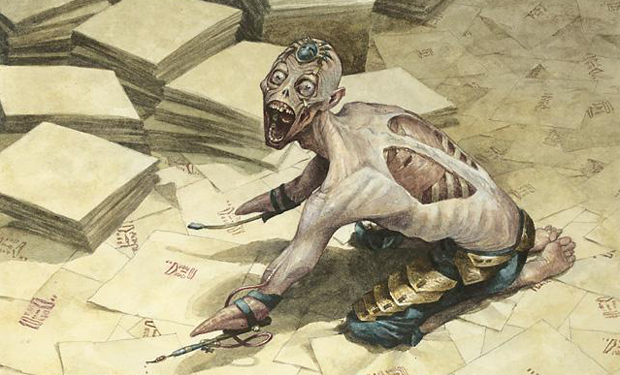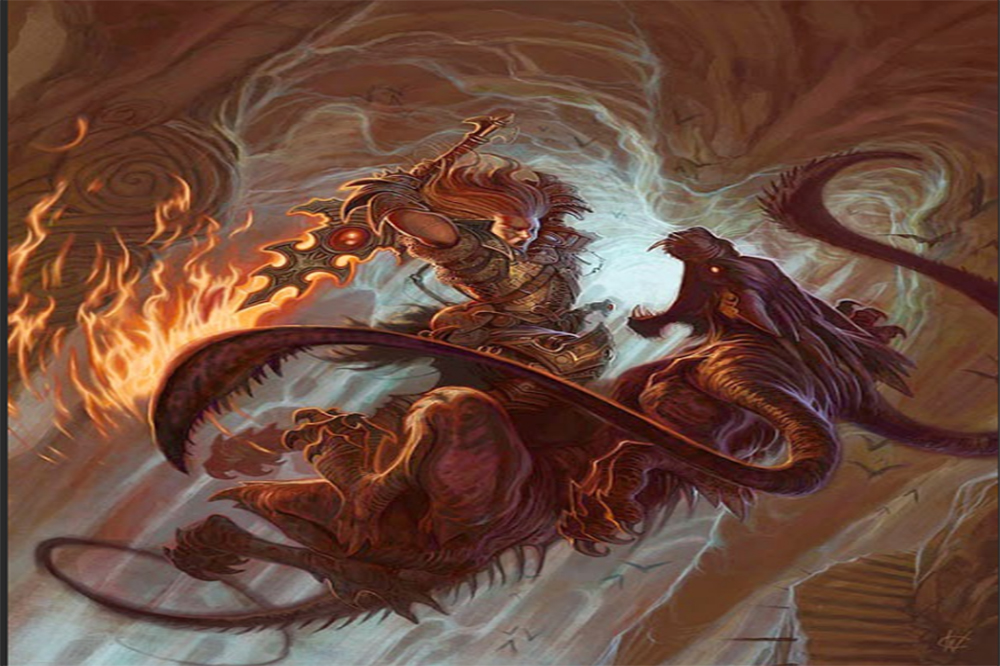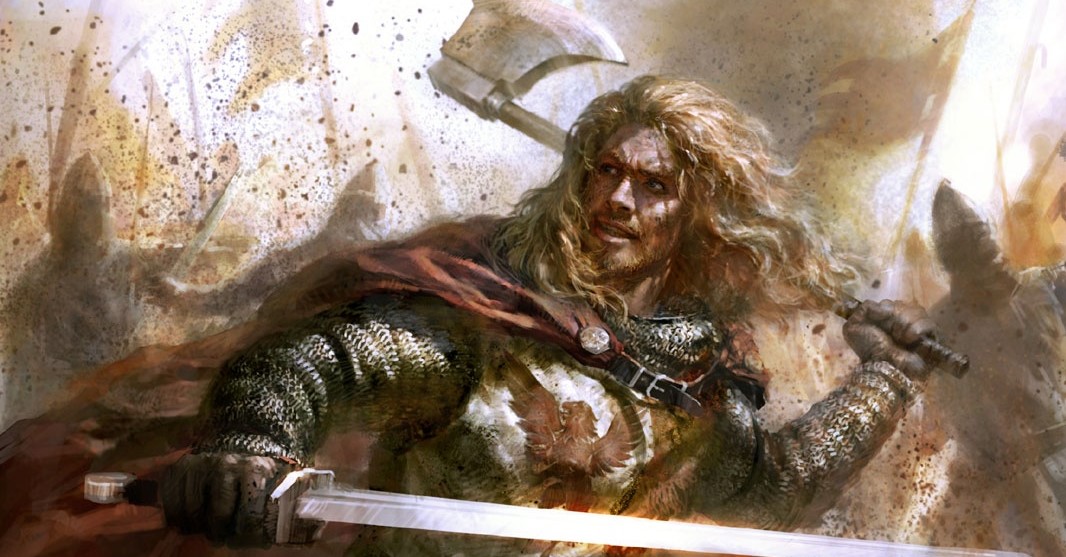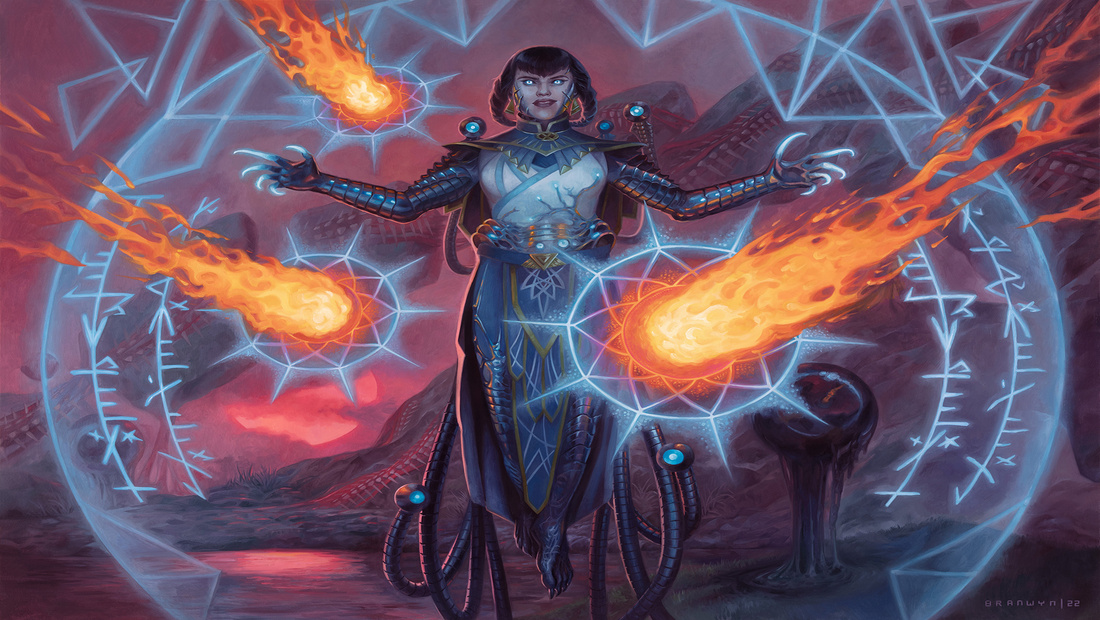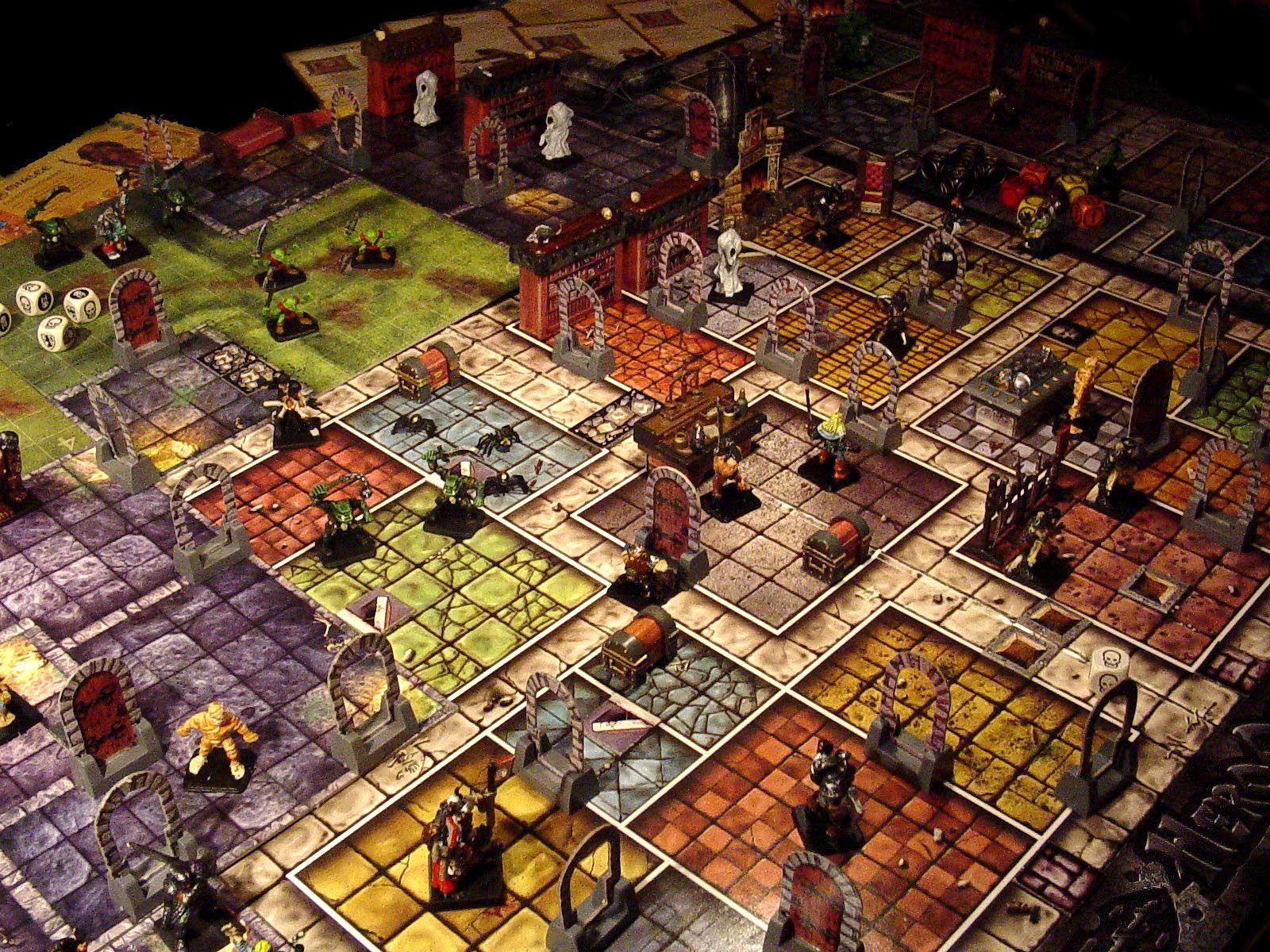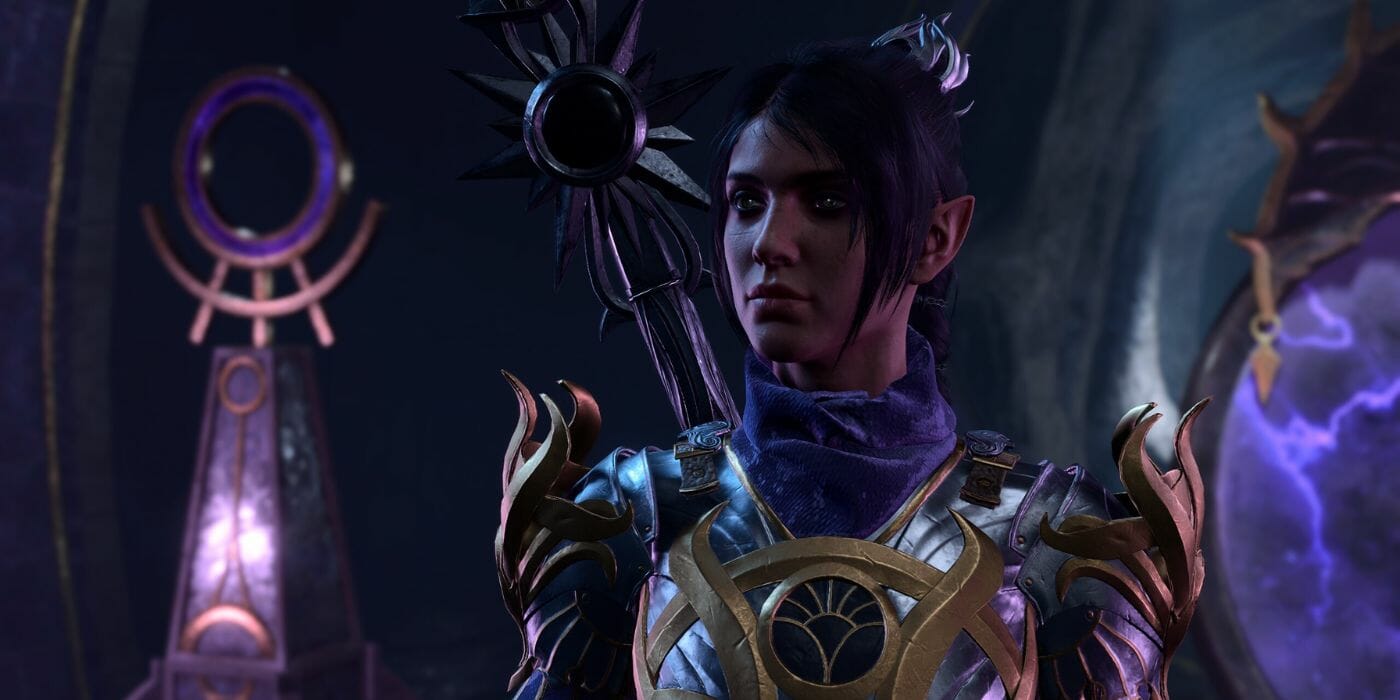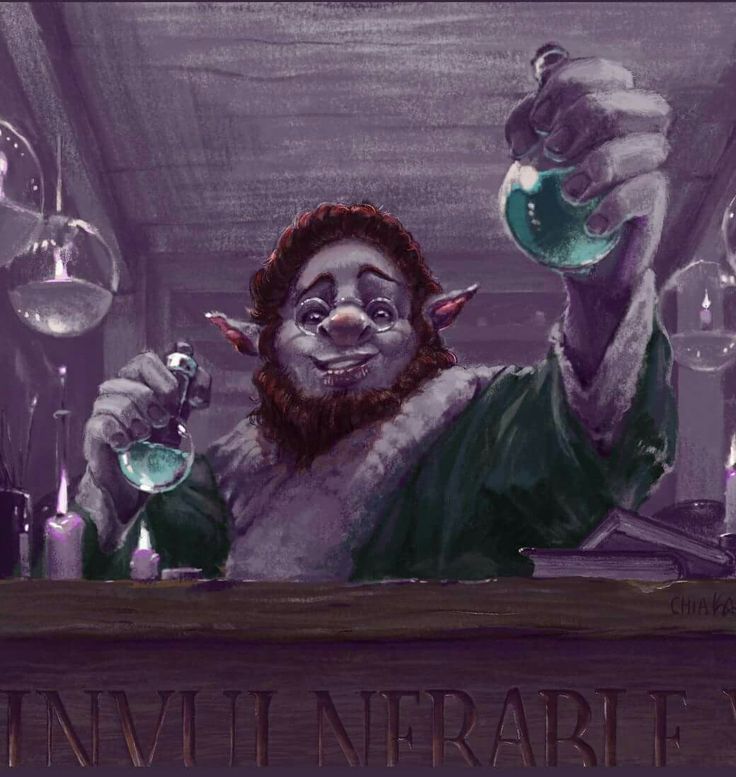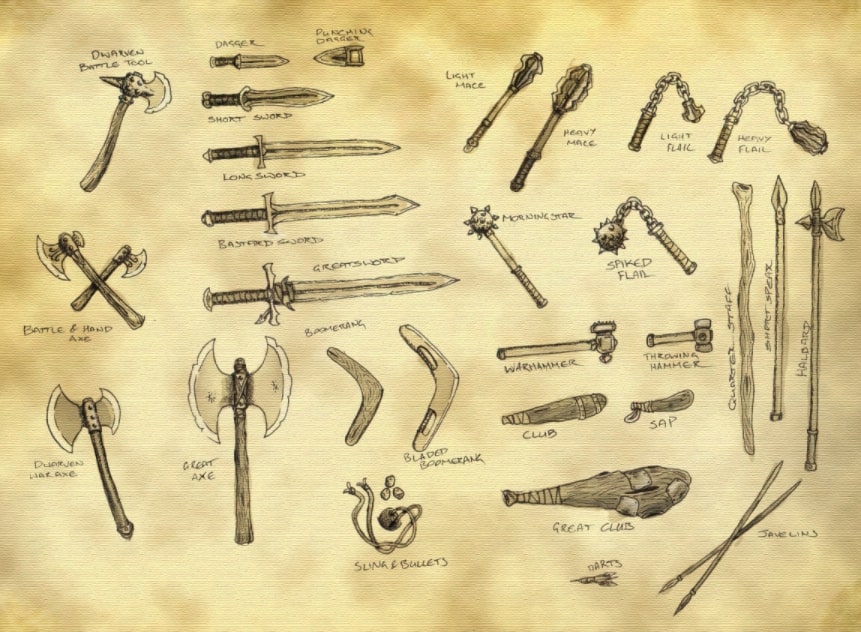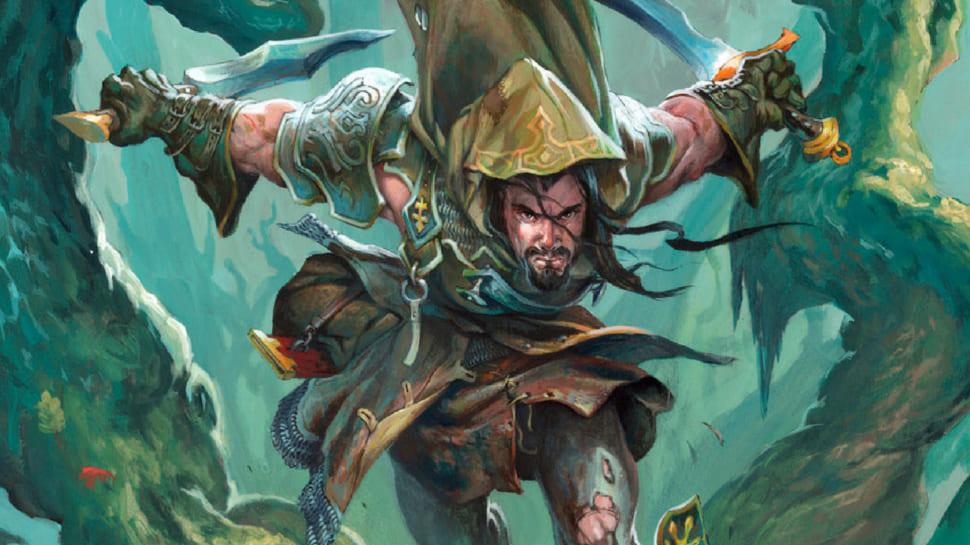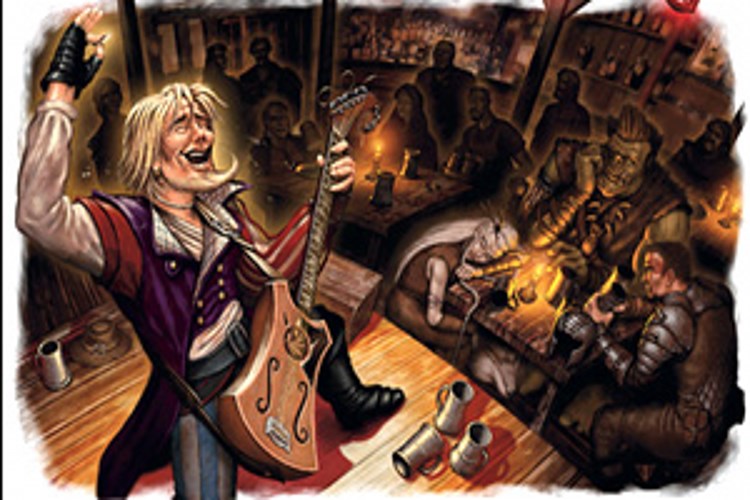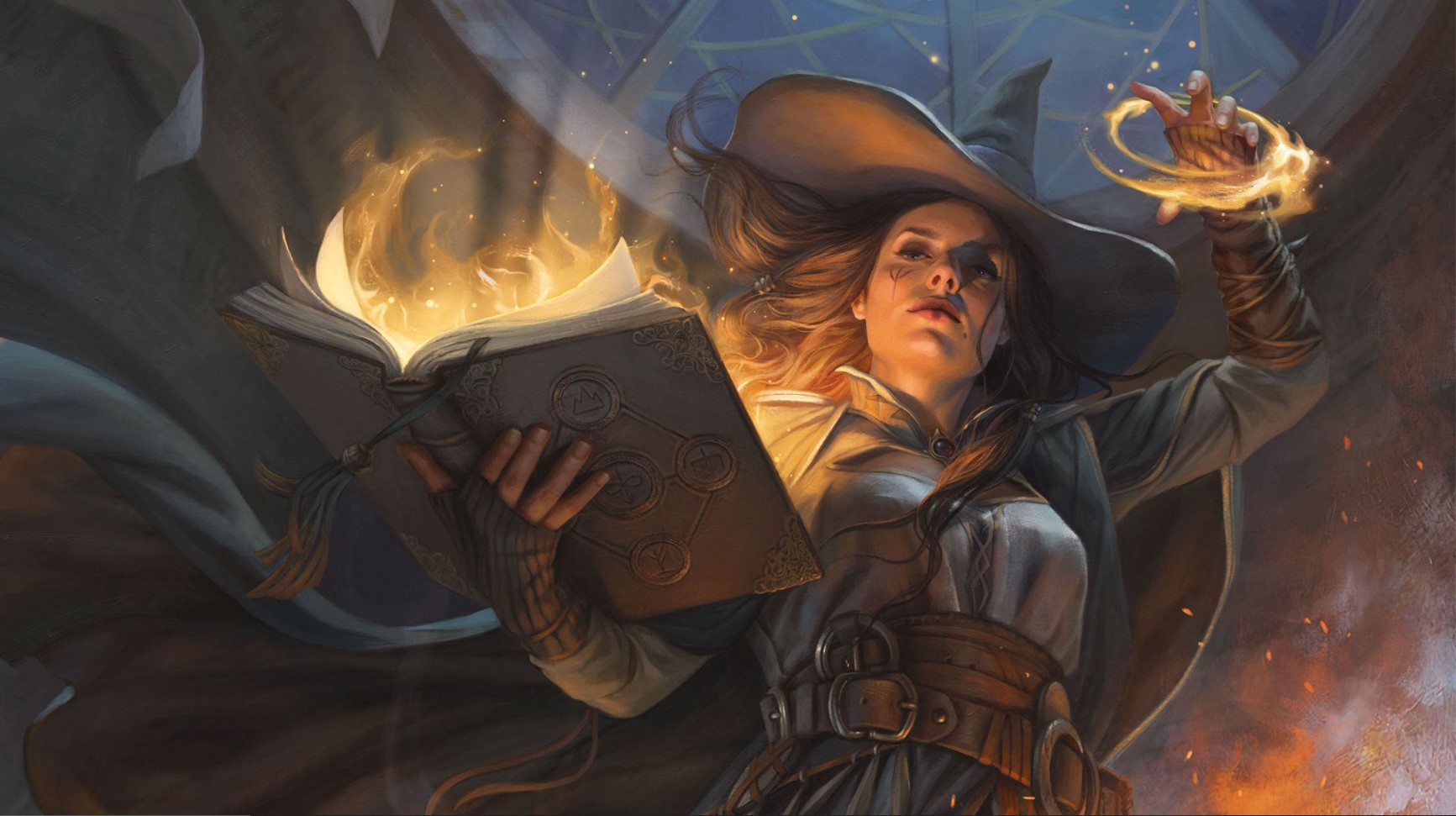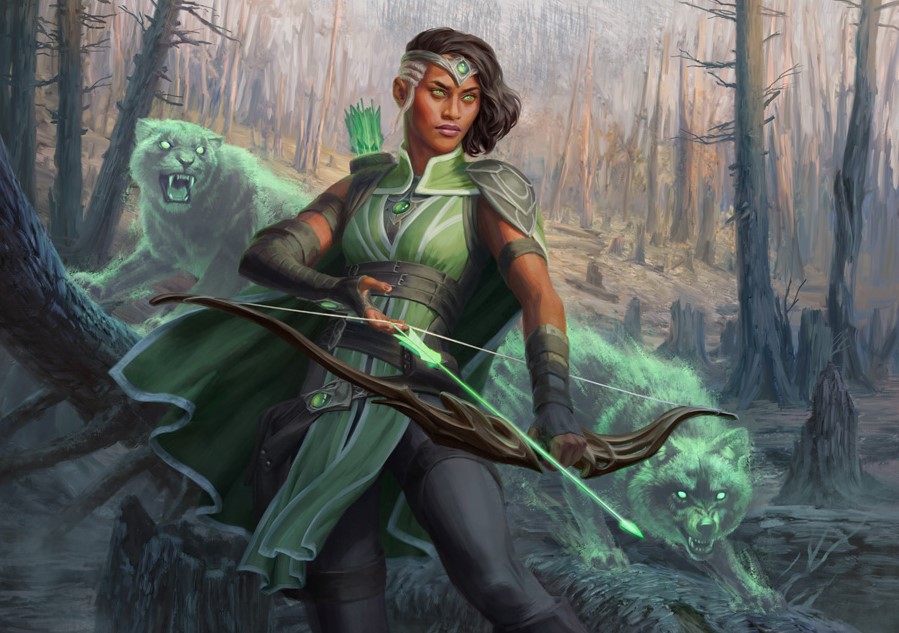
Clerics can be as diverse as the deities they serve. Their devotion fuels their actions, and their divine partnership emboldens them to shape the world. They can bring light into the world (literally!), embrace the chaos of nature, or maintain the order of the universe.
The feats available to clerics are just as broad, giving them the tools and skills to become whatever they want to be. They can be healers, damage-dealers, and sources of divine direction. The world opens up before them, calling them out on grand adventures.
Here are my top ten feats that will take your cleric from a holy healer to the avatar of divine energy.
10. Chef (TCoE)

Wizards of the Coast: Gyome, Master Chef by Steve Prescott
Bon appetit! Chef lets you make healing snacks to sustain you on your adventures.
The Chef feat is largely played for goofs, but it can be surprisingly useful! With health boosts that your party mates can carry around with them, your cleric can create a renewable source of minor healing while stockpiling big spells for both damage and health. It's time to roll up your sleeves and prepare some delicious bonbons.
Magical snacks are always appreciated, both in and out of game! In all seriousness, Chef’s healing food is a cheap way to keep renewable health items on hand, saving you both health potions and spells. In addition, it also increases your choice of the cleric’s most-used stats, giving them more arcane power as well as a solid foundation of health.
This feat is advantageous for a cleric because it takes some of the pressure off of the cleric’s spellcasting abilities. While Chef’s healing snacks don’t grant a large amount of health, they can keep your character standing even when they are separated from their healer or are out of spell slots. In addition, the background is so creative that it inspires engaging roleplay, making the session more fun for everyone involved!
Why Chef is Great for Clerics:
- Wisdom is a virtue: Both Wisdom and Constitution are your highest stats as a cleric. Wisdom increases your spellcasting ability while Constitution increases your hit points, both of which are vital to your success as a cleric.
- Be our guest, be our guest: Chef allows you to make special foods for yourself and allies, granting them hit points upon eating them. Snacks made during a short rest restore hit points, while long rest snacks grant temporary hit points, both of which are boons to keep you and your allies healthy.
- Travel snacks: The snacks made during a long rest can be stored for a short time, allowing yourself and your allies to prepare for the next encounter. Both health potions and healing spells can be costly, even to a cleric, so any low-cost healing items may keep your party going, even when stealthing through the hinterlands or another plane of existence.
- Bonus healing: While 1d8 bonus hit points and temporary points equal to your proficiency may not sound like much, even a few extra hit points may keep you and your allies in the fight just long enough to strike the killing blow. This is especially useful when you are out of spell slots and cannot cast healing spells.
Chef
- Time and effort spent mastering the culinary arts has paid off. You gain the following benefits:
- Increase your Constitution or Wisdom score by 1, to a maximum of 20.
- You gain proficiency with cook’s utensils if you don’t already have it.
- As part of a short rest, you can cook special food, provided you have ingredients and cook's utensils on hand. You can prepare enough of this food for a number of creatures equal to 4 + your proficiency bonus. At the end of the short rest, any creature who eats the food and spends one or more Hit Dice to regain hit points regains an extra 1d8 hit points.
- With one hour of work or when you finish a long rest, you can cook a number of treats equal to your proficiency bonus. These special treats last 8 hours after being made. A creature can use a bonus action to eat one of those treats to gain temporary hit points equal to your proficiency bonus.
9. Heavily Armored (PHB)

Wizards of the Coast: Mordenkainen's Tome of Foes, image by Craig J. Spearing
Heavily Armored will ensure you stay protected from the most deadly attacks.
Armor is the barrier between yourself and your enemies, and the heavier the better. Clerics can become the tanks of the party, but they only have proficiency with lower grades of armor. Heavily Armored clerics have proficiency in the highest-grade armor, making them nearly invulnerable to even the sharpest blades.
Clerics can always use a boost to their Strength, one of their highest and most used stats. In addition, Heavily Armored’s main feature grants them proficiency with heavy armor. Since clerics only have proficiency with light or medium armor and shields upon creation, this can put them on par with other heavy-duty classes like fighters and paladins.
This feat is especially advantageous for a cleric because it boosts the cleric’s abilities. formidable foes. Both a Strength boost and heavy armor proficiency make them powerhouses in combat, able to deal and take loads of damage. Heavily Armored clerics have enhanced innate Strengths (pun intended), transforming them into even more formidable warriors.
Why Heavily Armored is Great for Clerics:
- Indestructible: Heavy armor will give your cleric an edge in battle. Heavily Armored clerics will be more difficult to hit, but they will remain as fierce as ever!
- You lift?: Strength is one of your strongest stats as a cleric. Any increase in strength will help your melee attacks and strength-based abilities, such as Channel Divinity in certain domains, such as the appropriately named Strength Domain.
- I love your plate mail!: Clerics only start out with proficiencies in light and medium armor and shields. Heavy armor is both a boost to your character as well as an extra means of protection against particularly dangerous foes.
Heavily Armored
Prerequisite: Proficiency with medium armor
- You have trained to master the use of heavy armor, gaining the following benefits:
- Increase your Strength score by 1, to a maximum of 20.
- You gain proficiency with heavy armor.
8. Martial Adept (PHB)

Wizards of the Coast: Destroy Evil by Anna Christenson
Take inspiration from the fighter class by utilizing some of their Battle Master maneuvers.
While some may disagree, combat encounters are an important part of D&D 5e. Many of these complaints come from the lack of variety and creativity in combat, at least on the surface level. Martial Adept reveals the fighter's fighting techniques, making combat much more creative and unique.
Clerics can hit hard, but their main combat abilities are limited to martial attacks and any melee spells they prepare. Martial Adept gives other classes access to the fighter’s Battle Master fighting maneuvers. These fighting maneuvers can give you more options during combat and can challenge you to be more strategic when fighting.
This feat is advantageous for a cleric because it opens up other classes’ features, particularly combat features, to the cleric class. The Battle Master fighter has a long list of fighting maneuvers your cleric can take advantage of with this feat. In doing so, you can synergize these maneuvers with other abilities or actions to turn the battle in your favor.
Why Martial Adept is Great for Clerics:
- Fight, fight, fight!: The Battle Master archetype of the fighter class has a long list of maneuvers to spice up their combat, making encounters more interesting for the entire group. Clerics can dip into this list, adding some of the fighting maneuvers to their own repertoire.
- Martial clerics thrive: Clerics have a good deal of martial-exclusive abilities from their archetypes and general class features. Martial Adept provides them with a few more, making each encounter a new challenge, even if you fight the same goblins.
- Tough skin: Clerics already possess a high Strength stat, one of their highest stats overall. When applied to the fighter’s fighting maneuvers, this will give your cleric the tools to become a well-rounded fighter like the Battle Master.
- Feeling superior?: The fighter’s superiority die is the currency which powers their fighting maneuvers. While the cleric doesn’t receive as many as the full fighter class, they can take advantage of one die to use with the vast collection of fighting maneuvers.
Martial Adept
- You have martial training that allows you to perform special combat maneuvers. You gain the following benefits:
- You learn two maneuvers of your choice from among those available to the Battle Master archetype in the fighter class. If a maneuver you use requires your target to make a saving throw to resist the maneuver's effects, the saving throw DC equals 8 + your proficiency bonus + your Strength or Dexterity modifier (your choice).
- You gain one superiority die, which is a d6 (this die is added to any superiority dice you have from another source). This die is used to fuel your maneuvers. A superiority die is expended when you use it. You regain your expended superiority dice when you finish a short or long rest.
7. Sentinel (PHB)

Wizards of the Coast: Elite Arrester by Cynthia Sheppard
Sentinel will stop your enemies in their tracks and open them up to your attacks.
Clerics are known for their healing, but isn’t it best if you don’t need healing in the first place? Sentinel gives your cleric the advantage when the opportunity (attack) arises, stopping your enemies in their tracks.
Opportunity attacks allow you to get in just a little more damage, but Sentinel provides even more benefits for this feature. In addition to the damage, Sentinel completely reduces your enemy’s speed. It also gives you more opportunities to activate opportunity attacks, an invaluable ability for any strong damage-dealers like the cleric.
This feat is especially advantageous for a cleric because it puts the cleric’s combat strengths to even greater use. Stopping an enemy completely with opportunity attacks gives your cleric and allies the chance to flank them, dealing even more damage. More opportunity attacks mean more opportunities to activate this feature, turning your cleric into a battle-hungry whirlwind.
Why Sentinel is Great for Clerics:
- New perks to opportunity attacks: Opportunity attacks typically only provide an extra attack, then you need to chase down your enemy. With Sentinel, opportunity attacks immobilize your opponent and prevent them from using the Disengage action to flee.This is especially useful if your cleric has a melee focus.
- Get back over here!: Sentinel gives your cleric an extra attack when an enemy targets someone else, essentially forcing them to target you or risk getting targeted themselves. This can give your allies a chance to pick off the weaker baddies or position themselves to flank your opponent.
- Protective nature: Sentinel pairs nicely with other cleric abilities like Channel Divinity, Destroy Undead, and other abilities specific to cleric domains like Divine Strike. Each ability makes sure you and your allies are protected, tipping the odds in your favor in each fight.
Sentinel
- You have mastered techniques to take advantage of every drop in any enemy's guard, gaining the following benefits:
- When you hit a creature with an opportunity attack, the creature's speed becomes 0 for the rest of the turn.
- Creatures provoke opportunity attacks from you even if they take the Disengage action before leaving your reach.
- When a creature within 5 feet of you makes an attack against a target other than you (and that target doesn't have this feat), you can use your reaction to make a melee weapon attack against the attacking creature.
6. Observant (PHB)

Wizards of the Coast: Talas Lookout by Julia Metzger
Nothing will escape your keen vision with Observant, keeping you in the know.
Eagle-eyed characters are always in demand. Whether it be spotting a mysterious footprint or noticing a shifty guard, high Perception and Investigation each come in handy regardless of your campaign setting. Observant gives your cleric the skills to pick up on things other characters may not.
I always take proficiency in Perception at the beginning of my campaigns. A high Perception stat directly translates to high Passive Perception, giving your character the advantage when your DM has a new trick up their sleeve. For a cleric, this boost in Perception will make you ready to fight (or heal) whoever tries to sneak up on you.
This feat is advantageous for a cleric because Perception is vital to all characters, especially those with advantageous abilities. Clerics can not only heal those who go down, but they can also rack up the damage and cast handy spells to trip up your enemies. Their abilities are useful not only to themselves but to any allies and party mates nearby.
Why Observant is Great for Clerics:
- Wise choice: Wisdom is your highest stat as a cleric. Any boost to Wisdom will aid your spellcasting, granting you more arcane abilities and features to utilize both in combat and across the campaign.
- I can see everything: An additional +5 to Perception and Investigation checks is an incredible advantage! Every single campaign I’ve been a part of has progressed the plot and made our party feel like professional detectives (or amateur sleuths) with a series of Perception and Investigation checks. A bonus to these abilities, even the passive scores, will give you a real advantage.
- What was that?: While it may seem situational, Observant allows you to read the lips of another person speaking your language. This could be useful in a campaign focusing on political intrigue or secret societies, or simply if you want to snoop on an NPC.
Observant
- Quick to notice details of your environment, you gain the following benefits:
- Increase your Intelligence or Wisdom score by 1, to a maximum of 20.
- If you can see a creature's mouth while it is speaking a language you understand, you can interpret what it's saying by reading its lips.
- You have a +5 bonus to your passive Wisdom (Perception) and passive Intelligence (Investigation) scores.
5. Shadow Touched (TCoE)

Wizards of the Coast: Rona’s Vortex by Dominik Mayer
Ooh, Shadowfell. What dark magic have you picked up from your adventures to this shadowed plane?
Shadowfell, the mysterious plane of darkness connected to the Material Plane, can be a dangerous place to visit. If you do manage to get there and back alive, it can leave you with lingering effects. Shadow Touched bestows upon your cleric new abilities and spells influenced by Shadowfell itself.
Invisibility is a very versatile spell, both in and out of combat. It is not on the cleric’s spell list, so taking Shadow Touched will grant you a new spell that no other cleric has. In addition, you also gain another spell from the Illusion or Necromancy categories and a boost to Wisdom, your spellcasting ability, making your spells even more spectacular.
This feat is advantageous for a cleric because it grants new spells and boosts their spellcasting. Shadow Touched grants two new spells to clerics, one of which is from an alternate spell list. The other spell could also be from another class’s spell list, as long as it is from one of the aforementioned schools of magic.
Why Shadow Touched is Great for Clerics:
- Wise choice: Wisdom is your highest stat as a cleric. Any boost to Wisdom will aid your spellcasting, granting you more arcane abilities and features to utilize both in combat and across the campaign.
- Now you see me, now you don’t: Invisibility can be incredibly useful, both in and out of combat, letting you turn yourself or your allies invisible until you attack or cast a spell. It is not present on the cleric’s spell list, so this feat not only grants you a new spell but also lets you cast it once without using a spell slot.
- Bonus spell and slot: In addition to invisibility, Shadow Touched grants an extra first-level spell from the Divination or Enchantment lists. This means you can take an extra spell from another class’ spellcasting list and not consume a spell slot upon use.
- Pair with Inspiring Leader: If you take both Shadow Touched and Inspiring Leader, a boost in Charisma rather than Wisdom will allow you to grant more temporary hit points to both yourself and your allies.
Shadow Touched
- Your exposure to the Shadowfell's magic has changed you, granting you the following benefits:
- Increase your Intelligence, Wisdom, or Charisma score by 1, to a maximum of 20.
- You learn the invisibility spell and one 1st-level spell of your choice. The 1st-level spell must be from the Illusion or Necromancy school of magic. You can cast each of these spells without expending a spell slot. Once you cast either of these spells in this way, you can't cast that spell in this way again until you finish a long rest. You can also cast these spells using spell slots you have of the appropriate level. The spells' spellcasting ability is the ability increased by this feat.
4. Gift of the Gem Dragon (FToD)

Wizards of the Coast: Fizban’s Treasury of Dragons, Adult Sapphire Dragon
More and more dragons! This time, the gem dragons are granting you telekinetic energy.
Gem dragons are arguably the prettiest of the bunch. They possess unique abilities from the other types of dragons—abilities they have generously bestowed upon you! Your cleric will gain a fancy bit of telekinesis with an ability score boost, just for fun.
Gift of the Gem Dragon’s Telekinetic Reprisal is a fun damage boost to spice up your combat abilities. It uses your reaction, a neat feature for clerics, and grants a slightly larger damage boost than typical ability features. In addition, your cleric can boost their Wisdom spellcasting ability with this feat, supercharging your arcane abilities.
This feat is especially advantageous for a cleric because it synergizes nicely with cleric abilities. An increase in Wisdom and an extra source of damage are always boons for a cleric. Telekinetic Reprisal also utilizes your reaction, which gives your cleric an extra source of damage output.
Why Gift of the Gem Dragon is Great for Clerics:
- Keep your wits about you: Wisdom is your highest stat as a cleric. Any boost to Wisdom will aid your spellcasting, granting you more arcane abilities and features to utilize both in combat and across the campaign.
- Step back: A successful Telekinetic Reprisal shoves your enemy backwards in addition to dealing damage. This shove can be used strategically in a chaotic battlefield, possibly pushing your enemies off a cliff, into a trap, or into an environmental hazard.
- Think fast!: Telekinetic Reprisal utilizes your reaction, which gives your cleric the opportunity for an extra damage boost each turn.
- Decent damage: Feats are not well known for granting a large amount of flat damage or healing, often being limited to a single die. Gift of the Gem Dragon grants an extra die of force damage upon a failed save, totaling 2d8. While still not a significant amount of damage, Telekinetic Reprisal can be utilized multiple times per long rest, chipping away at your enemy’s health.
Gift of the Gem Dragon
- You’ve manifested some of the power of gem dragons, granting you the following benefits:
- Ability Score Increase. Increase your Intelligence, Wisdom, or Charisma score by 1, to a maximum of 20.
- Telekinetic Reprisal. When you take damage from a creature that is within 10 feet of you, you can use your reaction to emanate telekinetic energy. The creature that dealt damage to you must make a Strength saving throw (DC equals 8 + your proficiency bonus + the ability modifier of the score increased by this feat). On a failed save, the creature takes 2d8 force damage and is pushed up to 10 feet away from you. On a successful save, the creature takes half as much damage and isn’t pushed. You can use this reaction a number of times equal to your proficiency bonus, and you regain all expended uses when you finish a long rest.
3. Fey Touched (TCoE)

Wizards of the Coast: Vineshaper Prodigy by Inka Schulz
Journey to the feywild! Fey Touched grants you additional spells from the fey realm.
Journey with me to the feywilds, where the sprites are abundant and the dangers are lurking just behind the glamour. Your cleric has gained some useful features from their time in the fey realm, granting them unique abilities. Fey Touched also grants them access to the spell lists of other classes, broadening their arcane repertoire.
Misty step, a spell not on the cleric spell list, is super useful for a cleric. It gets them up close and personal with their nearest baddie, in just the right spot to deal some massive damage. The bonus Wisdom boost is nothing to shake a stick at either, boosting your spellcasting abilities to make your spells more difficult to escape from.
This feat is advantageous for a cleric because it grants clerics unique maneuverability. Misty step will take them where they need to go, either out of harm’s way or into the fire. The stat boost will make their spells more powerful, granting larger and more potent effects to enemies and allies alike.
Why Fey Touched is Great for Clerics:
- We’re not in Kansas anymore: What caused your character to become Fey Touched?Did they meet a denizen of the feywild? Were they tricked or lured in? Are they being rewarded for a good deed? Discuss with your DM the prevalence of the feywild in your campaign.
- Wise choice: For a cleric, an increase to Wisdom also increases your spellcasting ability. Fey Touched can increase your spellcasting modifier, granting you even more arcane power!
- Twinkle toes: Misty step is one of my favorite spells because it grants the user much more mobility, especially in sticky situations. It is not present on the cleric’s spell list, so this feat not only grants you a new spell but also lets you cast it once without using a spell slot.
- Bonus spell and slot: In addition to misty step, Fey Touched grants an extra first-level spell from the Divination or Enchantment lists. This means you can take an extra spell from another class’ spellcasting list and not consume a spell slot upon use.
- Pair with Inspiring Leader: If you decide to take both Fey Touched and the next feat on this list, Inspiring Leader, a boost in Charisma instead of Wisdom will allow you to grant more temporary hit points to both yourself and your allies.
Fey Touched
- Your exposure to the Feywild's magic has changed you, granting you the following benefits:
- Increase your Intelligence, Wisdom, or Charisma score by 1, to a maximum of 20.
- You learn the misty step spell and one 1st-level spell of your choice. The 1st-level spell must be from the Divination or Enchantment school of magic. You can cast each of these spells without expending a spell slot. Once you cast either of these spells in this way, you can’t cast that spell in this way again until you finish a long rest. You can also cast these spells using spell slots you have of the appropriate level. The spells’ spellcasting ability is the ability increased by this feat.
2. Inspiring Leader (PHB)

Wizards of the Coast: Tori D’Avenant, Fury Rider by Anna Podedworna
Feel inspired! Inspiring Leader grants you and your allies temporary hit points to empower them against evil.
While not the paragon of justice that paladins embody, clerics are sources of divine guidance for both themselves and their allies. When evil surrounds you and you need some hope from a holy source, Inspiring Leader can be your cleric’s time to shine. Temporary hit points abound as your cleric shares their heartening message for all to hear.
Inspiring Leader gives you a reason to invest some of your time and energy into Charisma. Temporary hit points are hard to come by but can provide a great deal of relief to a party in over their heads. With Inspiring Leader, clerics can both provide preventative and reactive healing to themselves and their allies.
This feat is advantageous for a cleric because it provides another avenue to showcase your cleric’s healing abilities. While not traditional healing, temporary hit points can prevent enemies from digging into your main HP pool. These points can be invaluable, especially when your cleric has strong Charisma to back it up.
Why Inspiring Leader is Great for Clerics:
- Motivational presence: Inspiring Leader allows you to inspire yourself and your allies, granting a powerful boon to face whatever dangers lurk ahead.
- Charismatic speaker: Inspiring Leader utilizes your Charisma modifier when determining the amount of temporary hit points you grant. While clerics don’t typically take Charisma as one of their highest stats, Inspiring Leader’s temporary hit points may entice you to spend some time developing it.
- It’s fine, we’re gods: Temporary hit points provide a bit of extra padding to beef up your characters in a tricky combat encounter. These are depleted before your actual health, so you could go an entire encounter without losing a single hit point.
Inspiring Leader
Prerequisite: Charisma 13 or higher
- You can spend 10 minutes inspiring your companions, shoring up their resolve to fight. When you do so, choose up to six friendly creatures (which can include yourself) within 30 feet of you who can see or hear you and who can understand you. Each creature can gain temporary hit points equal to your level + your Charisma modifier. A creature can't gain temporary hit points from this feat again until it has finished a short or long rest.
1. War Caster (PHB)

Wizards of the Coast: Serra Paragon by Heonhwa Choe
War Caster allows you to balance martial attacks and spellcasting during combat, which is vital for dual classes like the cleric.
Spellcasting and martial combat can be difficult to balance. Concentration spells can make or break your plans, and opportunity attacks are limited to melee. With War Caster, spellcasting becomes more viable in combat, allowing you to utilize both without sacrificing your pizzazz.
War Caster is great for clerics because they utilize both spellcasting and martial combat. Clerics have a lot of concentration spells, so they could use some advantage on saving throws to keep those spells going. War Caster allows you to cast spells as your opportunity attack, for which clerics have a variety of useful damage spells, including sacred flame and guiding bolt.
This feat is especially advantageous for a cleric because it makes the most of the cleric’s dual combat abilities. Concentration can be difficult, but as a warcaster, you have an advantage when it comes to keeping any long-term spells active. Being able to utilize spells as opportunity attacks is also invaluable, giving you an epic blast of arcane energy whenever an enemy tries to escape.
Why War Caster is Great for Clerics:
- Best of both worlds: War Caster allows your cleric to utilize both melee attacks and spellcasting simultaneously during combat. Whereas one would typically become your character’s focus and the other would be utilized in niche scenarios, War Caster allows you to play both styles effectively within a single combat encounter.
- Advantage on maintaining concentration: Even the best-laid plans can be waylaid by a spellcaster failing their save and dropping concentration. War Caster gives you advantage on Constitution saving throws for maintaining concentration, sharpening your focus for the battle ahead.
- See ma, no hands!: Not all DMs allow characters to cast spells with somatic components while their hands are full. War Caster allows you to bypass this requirement and cast spells even if you’re wielding a longsword.
- Opportunistic spellcasting: Opportunity attacks are typically restricted to melee attacks alone since they are provoked by movement, which is quite unfortunate for a cleric with a good spell list. With War Caster, your cleric can instead cast a spell to target your fleeing foe, illuminating them with sacred flame or guiding bolt before they get away.
War Caster
Prerequisite: The ability to cast at least one spell
- You have practiced casting spells in the midst of combat, learning techniques that grant you the following benefits:
- You have advantage on Constitution saving throws that you make to maintain your concentration on a spell when you take damage.
- You can perform the somatic components of spells even when you have weapons or a shield in one or both hands.
- When a hostile creature's movement provokes an opportunity attack from you, you can use your reaction to cast a spell at the creature, rather than making an opportunity attack. The spell must have a casting time of 1 action and must target only that creature.


